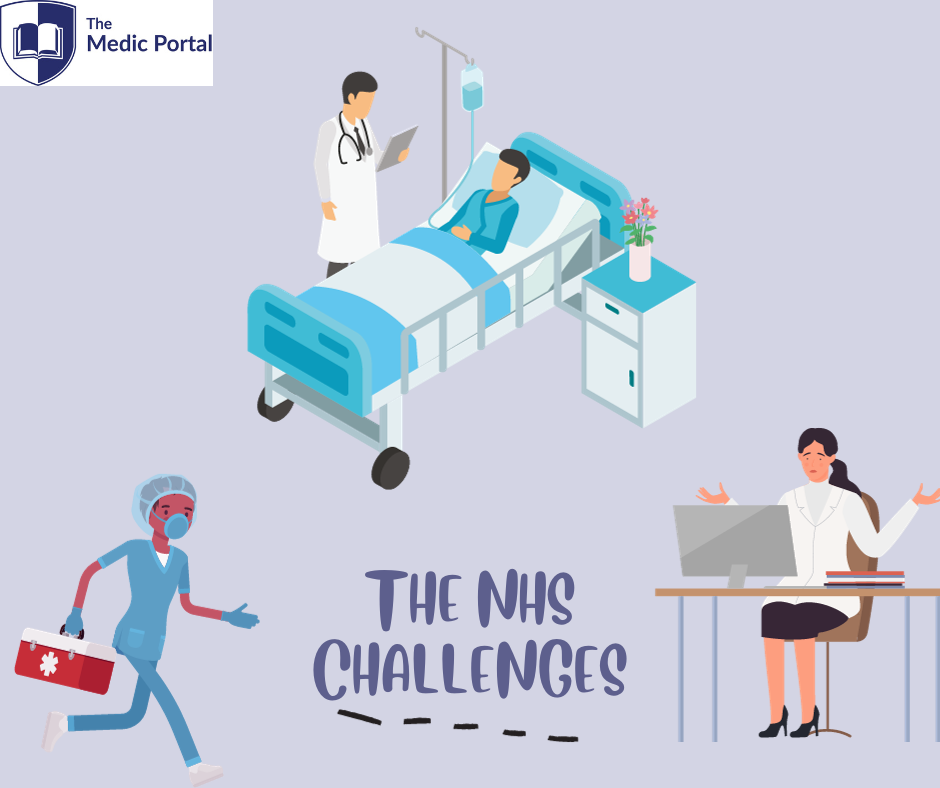
Why Do You Need To Know About Current NHS Challenges?
The NHS is a complex and ever-evolving healthcare system that faces various challenges, such as funding constraints, workforce shortages, and changing healthcare policies.
By staying informed about current NHS issues, aspiring medicine students can gain a deeper understanding of the healthcare landscape they will be entering and the potential impact these issues may have on their future practice.
Admissions committees are interested in candidates who demonstrate a genuine understanding of the healthcare system and its challenges. By showcasing your knowledge of current NHS issues, you can demonstrate engagement with the field and your ability to critically analyse complex healthcare topics.
The Top 5 Challenges Facing The NHS in 2025
Five of the key challenges currently facing the NHS are:
1. Insufficient funding
The demand for healthcare services continues to rise, but the funding allocated to the NHS has not kept pace with this increasing demand.
The lack of adequate funding puts a strain on resources, leading to longer waiting times, limited access to certain treatments, and difficulties in maintaining high-quality care. It also hampers the ability of the NHS to invest in new technologies and infrastructure improvements.
2. Staff shortages
The NHS is grappling with significant staff shortages across various healthcare professions, including doctors, nurses, and allied health professionals.
The shortage of healthcare professionals puts immense pressure on the existing workforce, leading to increased workloads, burnout, and compromised patient care. It also contributes to longer waiting times and reduced access to healthcare services.
Addressing staff shortages requires long-term workforce planning, recruitment strategies, and investment in training and development programs.
3. The backlog
The COVID-19 pandemic has exacerbated an already existing backlog of patients awaiting treatment and procedures within the NHS. The backlog refers to the accumulation of patients who have experienced delays in receiving necessary care due to resource constraints and disruptions caused by the pandemic.
This backlog poses a significant challenge as it impacts patient outcomes, increases waiting times, and puts additional strain on healthcare providers. Clearing the backlog requires additional resources, increased capacity, and innovative approaches to manage patient flow effectively.
Despite initiatives such as the elective backlog recovery plan (February 2022), waiting lists remain at an all time high and targets for 2024 have been missed. Other areas, such as emergency care admissions and urgent cancer referrals have also not recovered pre-pandemic statistics.
4. An ageing population
The UK’s population is ageing, which presents unique challenges for the NHS. An ageing population means a higher prevalence of chronic conditions and complex healthcare needs.
This places increased demands on healthcare services, including long-term care, specialised geriatric services, and end-of-life care.
The NHS must adapt to meet the specific needs of older adults, including integrated care models, enhanced community support, and improved coordination between healthcare and social care services.
5. Evolving healthcare needs
Healthcare needs and patterns are constantly evolving, driven by factors such as advancements in medical technology, changes in disease prevalence, and shifting societal expectations.
The NHS must adapt to these evolving needs to provide effective and patient-centered care.
This includes embracing digital health technologies, promoting preventive care, addressing mental health challenges, and ensuring equitable access to healthcare services across different populations.
Adapting to evolving healthcare needs requires flexibility, innovation, and a proactive approach to healthcare delivery.
Consequences
These factors in turn, have led to doctor strikes across the country in recent years which is a complicated issue with ethical implications that you need to be aware of in preparation for your Medicine interview.
Since March 2023, there have been a total of 44 days of strikes over pay rise disputes, in which the BMA (British Medical Association) asked for a pay correction of 35%. However, pay was not the sole reason for the strikes, as chronic underpayment has led to lots of doctors leaving the profession which leaves remaining workers with a lack of support and inadequate working conditions.
Under the new Labour government, in July 2024, a deal was accepted of a 22% pay rise, ending the strike action.
How Can The NHS Problems Be Resolved?
Economically, the NHS has always been a battleground. But let’s review which measures have already been implemented and what else can be done to solve the listed challenges facing the NHS.
Insufficient funding:
- Increase government funding: The government should allocate more resources to the NHS to ensure it has the necessary funding to meet the growing demand for healthcare services.
- Explore alternative funding models: Consider innovative funding models, such as public-private partnerships or social impact bonds, to supplement government funding and attract additional investment into the healthcare system.
- Prioritize healthcare spending: Allocate funds strategically, focusing on areas with the greatest need, such as primary care, mental health services, and preventive care.
Staff shortages:
- Increase recruitment and training: Implement targeted recruitment campaigns to attract more individuals into healthcare professions. Invest in training programs and provide incentives to encourage healthcare professionals to work in areas with the greatest shortages.
- Improve working conditions: Enhance working conditions, including workload management, flexible working arrangements, and career development opportunities, to attract and retain healthcare professionals.
- Utilize technology: Leverage technology, such as telemedicine and remote monitoring, to optimize the efficiency of healthcare professionals and alleviate some of the workload pressures.
Note: To address chronic staff shortages, the NHS has called for the government to double the number of Medical School places by 2030. There are also requests to double the number of adult nursing places by the end of the decade and to train thousands of new Doctors on-the-job as apprentices.
The backlog:
- Increase capacity: Invest in additional resources, such as staff, equipment, and facilities, to increase the capacity for delivering healthcare services and reduce the backlog.
- Prioritize urgent cases: Implement triage systems to prioritize patients based on the urgency of their condition, ensuring that those in critical need receive timely care.
- Collaborate with private providers: Explore partnerships with private healthcare providers to access additional capacity and resources to address the backlog.
An ageing population:
- Integrated care models: Develop integrated care models that bring together healthcare and social care services to provide comprehensive and coordinated care for older adults.
- Invest in geriatric services: Increase investment in specialized geriatric services, including geriatric assessment units, community-based care, and rehabilitation services, to meet the unique needs of older adults.
- Promote healthy ageing: Implement preventive measures and health promotion campaigns to support healthy ageing and reduce the burden of chronic diseases.
Evolving healthcare needs:
- Embrace digital health technologies: Invest in digital health solutions, such as telehealth, remote monitoring, and electronic health records, to improve access to care, enhance efficiency, and empower patients to manage their health.
- Focus on preventive care: Shift the healthcare system’s focus towards preventive care, including health education, screening programs, and early intervention, to reduce the burden of chronic diseases and improve population health.
- Foster collaboration and innovation: Encourage collaboration between healthcare providers, researchers, and industry stakeholders to drive innovation and adapt to evolving healthcare needs. This can involve initiatives such as research partnerships, innovation hubs, and funding for healthcare innovation projects.
Will NHS Challenges Come Up In My Medical School Interview?
Yes, it is possible for questions related to NHS challenges to come up during a medicine interview. Current NHS issues are a common topic for discussion at Medical school interviews.
Medical schools often want to assess applicants’ understanding of the healthcare system and their awareness of current issues in healthcare.
Some of the questions you could be asked include:
- “Can you discuss the impact of funding challenges on the NHS and patient care? How do you think this affects the practice of medicine?”
- “How do you think staff shortages in the NHS affect patient care? How would you address this issue as a future healthcare professional?”
- “What are your thoughts on the backlog of patients in the NHS and its impact on healthcare delivery? How would you prioritize patients in such a situation?”
- “What challenges do you anticipate in providing healthcare to an ageing population? How would you address the unique healthcare needs of older adults?”
- “How do you stay informed about emerging healthcare trends and advancements? How do you think these trends will shape the future of medicine?”
You could also be asked about recent developments or news affecting the NHS.
- The state of the NHS
- Brexit’s impact on the NHS
- A&E issues
- GP services and Primary Care issues
- The BAME community and the NHS
- Mental health services
- Antibiotic resistance
Make sure you familiarise yourself with NHS hot topics and practice interview questions to prepare.
Challenges Facing the NHS: Interview Tips
-
Funding challenges:
- Be aware of the current funding issues facing the NHS and their impact on healthcare services.
- Discuss the importance of efficient resource allocation and the need for sustainable funding models.
- Highlight your understanding of the financial constraints and your commitment to finding innovative solutions to optimize healthcare delivery.
-
Staff shortages:
- Acknowledge the impact of staff shortages on patient care and healthcare delivery.
- Emphasize the importance of recruitment and retention strategies to address this issue.
- Discuss your interest in initiatives that promote workforce development and your willingness to contribute to addressing the staffing challenges.
-
The backlog:
- Recognize the consequences of the backlog on patient outcomes and access to care.
- Highlight the need for efficient triaging and prioritization of cases to manage the backlog effectively.
- Discuss your interest in contributing to solutions such as increased capacity, collaboration with private providers, or innovative approaches to reduce waiting times.
-
An ageing population:
- Demonstrate an understanding of the challenges posed by an ageing population, such as increased demand for healthcare services and specialized geriatric care.
- Discuss the importance of integrated care models and interdisciplinary collaboration to meet the unique needs of older adults.
- Highlight your interest in geriatric medicine or initiatives that promote healthy ageing and preventive care.
-
Evolving healthcare needs:
- Stay informed about emerging healthcare trends, such as advancements in technology, personalized medicine, or population health management.
- Discuss your enthusiasm for embracing digital health technologies and your interest in staying updated on the latest research and innovations.
- Highlight your adaptability and willingness to learn and grow in response to evolving healthcare needs.

Remember, it’s essential to back up your statements with relevant examples, personal experiences, or research to demonstrate your knowledge and commitment to addressing these challenges facing the NHS.
Additionally, showcase your empathy, teamwork skills, and dedication to patient-centered care throughout your responses.
